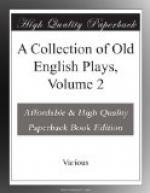With good accomodation. Two monthes paye
They have before hand for to make provision,
Needfull provision for so longe a voyage,
And two monthes paye theyr wives are yearely payd
The better to mayntayne theyr poore estate
Duringe the discontinuance of theyr husbands.
Yf in the voyage he doe chance to [MS. doe] dye
The widowe doth receave whatere’s found due,
Yf not by will disposed otherwise;
Which often happeneth to be such a sume
As they togeather never sawe the like.
And when did any of these widowes begge
For mayntenaunce in Churches as some doe?
Blackwall proclaymes theyr bountie; Lymehouse speakes
(Yf not ingrate) their liberalitie;
Ratcliffe cannot complayne nor Wapping weepe,
Nor Shadwell crye agaynst theyr niggardnes.
No, they doe rather speake the contrary
With acclamations to the highest heavens.
APPENDIX II.
The following note is by Mr. Robert Boyle, of St. Petersburg, a Shakespearian scholar, whose name is well known to readers of the Anglia and the New Shakspere Society’s Transactions. Mr. Boyle, who has a close acquaintance with Massinger, on seeing the proof-sheets of Sir John Van Olden Barnavelt, pointed out several repetitions of expressions used in other plays of Massinger. It will be understood that I do not adopt Mr. Boyle’s conclusions unreservedly. Possibly in an Appendix to Vol. IV. I may return to a consideration of Barnavelt, but the present volume has already swollen beyond its limits.
Sir John Van Olden Barnavelt.
This play, the most valuable Christmas present English scholars have for half a century received, appears indubitably to belong to the Massinger and Fletcher series. Even a cursory glance will convince the reader that it is one of the greatest treasures of our dramatic literature. That such a gem should lie in manuscript for over 200 years, should be catalogued in our first library, should be accessible to the eye of the prying scholar, and yet never even be noticed till now, affords a disagreeable but convincing proof of the want of interest in our early literature displayed even by those whose studies in this field would seem to point them out for the work of rescuing these literary treasures from a fate as bad as that which befell those plays which perished at the hands of Warburton’s “accursed menial.” The present play has some remarkable features in it. It is taken from contemporary history (the only one as far as we know of that class in which Massinger was engaged). It was written almost immediately after the events it describes. These events took place in the country in which Englishmen then took more interest than in any other country in Europe. There is




